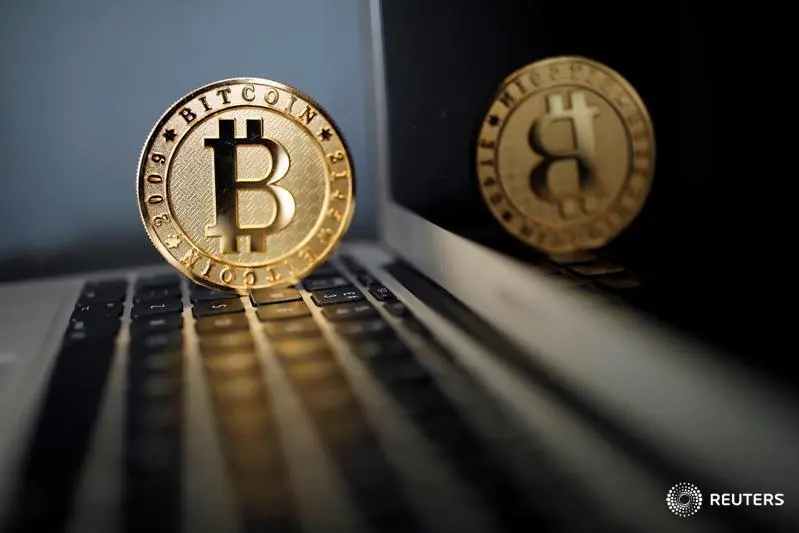PHOTO
HONG KONG - South Korea is taking an encouraging step in tackling bitcoin trading. The country’s Financial Services Commission on Tuesday announced a sensible curb on anonymous accounts, a move that should limit illicit activity. But hardliners are still itching to close down exchanges. That could backfire by pushing traders to use riskier venues instead. From next Tuesday, South Koreans will have to use real names that match their bank accounts in order to buy and sell bitcoin and other digital currencies. The local market has boomed: Seoul-based Bithumb is one of the world's busiest exchanges, handling almost $4 billion of crypto-currency trades a day, data from CoinMarketCaps show. But the industry has been largely unregulated. Forcing Bithumb, rivals and banks to run stricter identity checks would help limit money laundering and tax evasion.
This could be just the first step. Earlier this month, the justice minister said his department was preparing a bill to stop all exchange-based trading. Though the president’s office later said that was just one measure being considered, many policymakers remain steadfastly opposed to what they see as dangerous speculation.
Yet an outright ban could do more harm than good. Last year, China's central bank shut down the nation’s crypto-exchanges to combat fraud, money laundering and capital flight. That has pushed action onto murkier over-the-counter venues where buyers and sellers transact directly with one another. Industry insiders say many of these deals are done in cash, either though messaging apps or face to face, making it risky and out of reach to authorities.
A better option would be to regulate the exchanges and legitimise this activity, thus making it safer for investors. That's what Japan did last April, when it allowed crypto-currencies as a means of settlement. Trading venues there must also register with regulators, conduct annual audits, and enforce tough anti-money laundering measures. South Korea could follow a similar route, and make this less of a Wild West market; banning anonymity is a good first step.
CONTEXT NEWS
- South Korea will ban the use of anonymous bank accounts for trading bitcoin and other crypto-currencies from Jan. 30, Kim Yong-beom, vice chairman of the Financial Services Commission, said on Jan. 23.
- Kim told a news conference that local traders would only be able to deposit funds into named coin-exchange wallets from bank accounts with a matching name. The measure is meant to stop money laundering.
- Some policymakers reiterated on Jan. 18 that the government was considering shutting down all domestic virtual-currency exchanges. Police and tax authorities have raided some exchanges investigating potential tax evasion, Reuters reported on Jan. 11.
- There are more than a dozen such exchanges in South Korea, according to the Korea Blockchain Industry Association, including Bithumb, which is one of the world's busiest by trading volume.
(Editing by Quentin Webb and Katrina Hamlin)
© Reuters News 2018
This could be just the first step. Earlier this month, the justice minister said his department was preparing a bill to stop all exchange-based trading. Though the president’s office later said that was just one measure being considered, many policymakers remain steadfastly opposed to what they see as dangerous speculation.
Yet an outright ban could do more harm than good. Last year, China's central bank shut down the nation’s crypto-exchanges to combat fraud, money laundering and capital flight. That has pushed action onto murkier over-the-counter venues where buyers and sellers transact directly with one another. Industry insiders say many of these deals are done in cash, either though messaging apps or face to face, making it risky and out of reach to authorities.
A better option would be to regulate the exchanges and legitimise this activity, thus making it safer for investors. That's what Japan did last April, when it allowed crypto-currencies as a means of settlement. Trading venues there must also register with regulators, conduct annual audits, and enforce tough anti-money laundering measures. South Korea could follow a similar route, and make this less of a Wild West market; banning anonymity is a good first step.
CONTEXT NEWS
- South Korea will ban the use of anonymous bank accounts for trading bitcoin and other crypto-currencies from Jan. 30, Kim Yong-beom, vice chairman of the Financial Services Commission, said on Jan. 23.
- Kim told a news conference that local traders would only be able to deposit funds into named coin-exchange wallets from bank accounts with a matching name. The measure is meant to stop money laundering.
- Some policymakers reiterated on Jan. 18 that the government was considering shutting down all domestic virtual-currency exchanges. Police and tax authorities have raided some exchanges investigating potential tax evasion, Reuters reported on Jan. 11.
- There are more than a dozen such exchanges in South Korea, according to the Korea Blockchain Industry Association, including Bithumb, which is one of the world's busiest by trading volume.
(Editing by Quentin Webb and Katrina Hamlin)
© Reuters News 2018





















